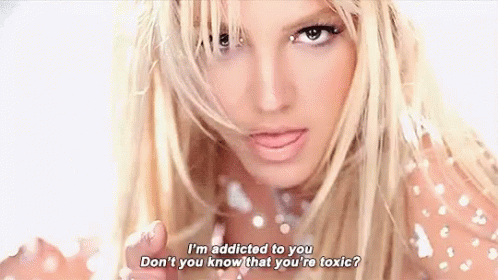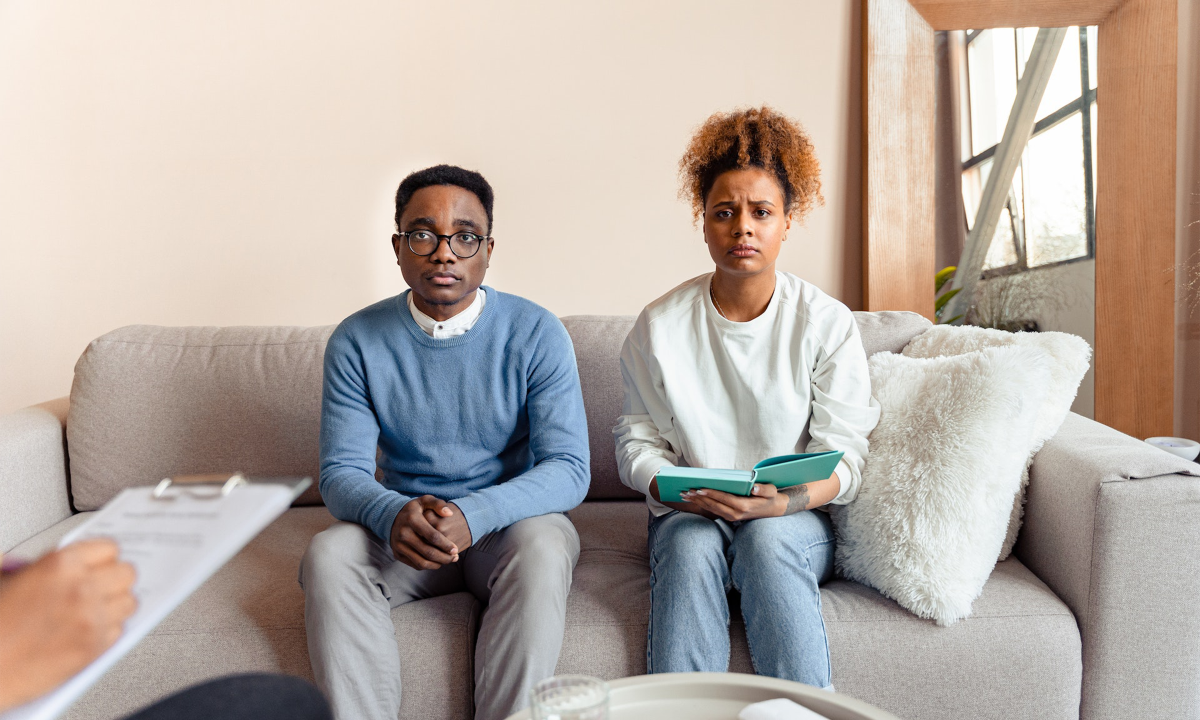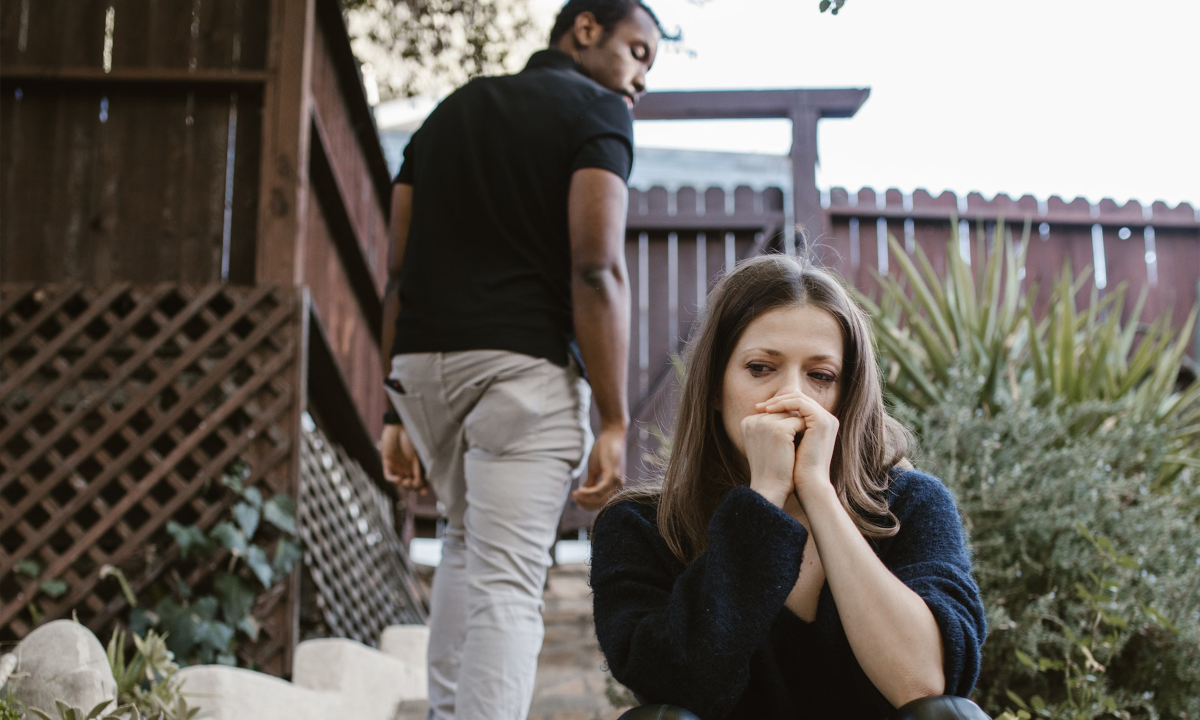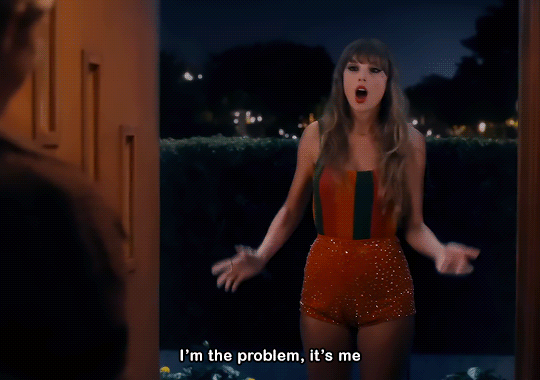How to fix a toxic relationship…
You love your partner.
But after days, weeks, or months of disconnection, escalating fights, mini-breakups, and more drama than an episode of Game of Thrones, you might start to wonder if your relationship is…
Toxic

…and if it is, how can you get back to feeling happy with each other again?
As a couples counselor, I’ve sat with many “toxic” relationships over the past 15 years—and helped them grow closer and happier than your neighbors Jack and Jane who “never argue.”
So I created this How-To For Fixing a Toxic Relationship to help people just like you.
Now, this is a complete guide, so we’re going to explore…
…and we’ll tackle some of the common misunderstandings about toxic relationships while we’re at it.
Each section will include helpful information for anyone who thinks they might be in a toxic relationship, but let’s jump straight to how to fix a toxic relationship ⬇

How to Fix a Toxic Relationship in 3 Steps
There is hope for your “toxic” relationship.
Below, I’ve broken down the steps I and the Empathi therapists use to help couples suffering in a toxic relationship.
Note that your relationship will have its best chance with an experienced EFT therapist to guide you.
But if you can’t attend counseling—such as if your partner isn’t willing or you can’t afford it—these steps may yet shed light on and improve your relationship.
Step 1: Get to Know the System Behind Your "Toxic" Relationship
This is the hardest step, and the most consequential.
If mending a toxic relationship—heck, ANY relationship—were a 400 meter race, 90% of couples who “don’t make it” tap out in the first 40 yards.
We need to take both partner’s stories about their “toxic relationship” and fit them inside a global narrative where they both make sense.
This means each partner has to, at some point, let go of their conviction that their partner is the one causing all the problems. Not easy!
It starts by recognizing that the relationship has three entities: Partner A, Partner B, and the system that they both create together (or “The Cycle).
And as a couples therapist, I need to understand how they all make perfect sense.
Let’s start with the partner’s stories…
Partner A: “Look, I’m really worried I can’t rely on my partner, they don’t do what they say they’ll do. I’m constantly in a place of anxiety. They say they’ll clean the house, they don’t clean the house.”
Therapist: “Oh, you must be scared all the time that you don’t know if your partner is going to be there for you!”
Partner B: “My partner’s really controlling. They want me to go to bed at a certain hour, get up at a certain hour, eat certain foods, be home from work at a certain hour…”
Therapist: “Whoa, I could understand that must be really threatening and really scary! It’s like you live inside a tight ship that’s really threatening and it’s not okay for you to be you.”
It makes sense! Each partner is getting hurt because it looks like the other isn’t giving them a flavor of love that they need.
But it doesn’t stop there.
Every couple experiences this negative cycle:
- Partner A gets hurt
- They react/protest
- Partner B gets hurt (by that protest)
- They react/protest
- Partner A gets hurt (by that protest)
And so on!
So for this couple, what reactive behaviors are they using to protect themselves that end up hurting the other person?
Let’s say Partner A gets hurt when Partner B doesn’t come home when they say they will, so protest by creating rules and boundaries for Partner B to live inside.
Which of course makes Partner B feel scared and like they’re not acceptable. And so they’re less likely to actually want to come home from work on time…
Which makes Partner A even more scared that they’re going to be abandoned, and so they create even tighter rules for when Partner B has to be home from work…
So Partner B feels like there’s no way they’ll ever be acceptable, they can’t live up to your standards, and they’re not going to come home for a week.
Partner A gets even more scared and says, “Well I’ll put locks on the doors so you can’t leave!!”
Yeesh! Okay, I think now I understand the toxicity of this relationship as a whole!
(And how to begin to fix this “toxic” relationship…)
Both of them are hurting and both of them try to get out of hurting in ways that make sense, but all they manage to do is make things worse.
Now, I present this story of the entity that is both of them together, how they both make perfect sense…
And I invite them to see the tragedy of the system.
Not just to feel sorry for themselves, stuck in this impossible relationship, but to feel really, deeply sad for the two of them together when they’re disconnected.
And this may be counterintuitive, but I want them to feel really sad and kind of hopeless together because of the pain they’re both in.
The tragedy of us.
I want them to feel, “You actually make sense to me, I make sense, and my heart is breaking for both of us. We’re just two wounded people and we only get stuck like this because we love each other.”
And before you know it, whether it’s literally or figuratively, they’re reaching out for each other.
Step 2: Explore Each Partner's Pain
Once each partner’s pain and the cycle they get into make sense—cognitively and emotionally—we can move onto the next part of the track:
A deep dive into one partner’s suffering (and then the other’s).
Most people will want to do this part first, but it only works if you do the first 100 meters…
From a place of “It’s both of us. We’re both hurting. I’m valid and you’re valid,” we can explain deeply the pain of one partner and organize it into a coherent story:
“I feel like I don’t matter”
Or
“I just feel like I’m always a disappointment.”
I help this partner to feel that fully—they’re in the pain of not mattering or the pain of always having been a disappointment.
Then, from that place of pain, they share it vulnerably and ask for their needs to be met.
Two things make this different from every other time they’ve tried to have their needs met by their partner from a place of pain:
- They’re asking from a vulnerable, non-reactive place.
- Their partner is available.
Now, their partner isn’t just trying to defend themselves or explain themselves, and can actually show up and love them in the places they’ve always longed to be loved.
So they’re able to experience love in the places they need love the most—which can actually be really overwhelming and vulnerable for people!
So I have to try to help clients stay in the present moment and actually let that love in.
Then we do the same thing for the other partner.
And so both of them get to have the experience of, “Oh my god, I asked from a place of vulnerability and you showed up and loved me and I’m actually letting it in.”
“I’m hurting and you’re here for me, and I’m actually here for you.”
“I’m enough for you and I’m here for you and you’re feeling loved.”
That’s the second and third 100 meters.
Step 3: Recognize and Integrate What You've Learned
For the last 100 meters of the 400 meters, we look back and go…
“Dudes, did you see what we just did??”
When you started, you thought your relationship was toxic and that there was something wrong with both of you.
But it turns out that you only ever got trapped in that suffering because you love each other!
You were able to deeply feel how sad this is for both of you—not just you, not just your partner, but both of you together.
Then you were really brave and felt your vulnerability and asked for your love needs to be met…
And your partner showed up and loved you in the ways you’ve always longed to be loved.
Then you did the same thing in the other direction.
Isn’t that just amazing?? Look how much you mean to each other.
Look at what you were able to do—and look at what you can accomplish again and again no matter what issue comes up between the two of you, forever.
THAT’s how to fix a toxic relationship.
In fact, “toxic relationship” my a**!
You’re just two people that love each other and got confused. There is nothing wrong with either of you.

What Is a Toxic Relationship & How Do You Know You’re in One?
Most people have very strong opinions about what a toxic relationship is: Your friends, your internet relationship guru, your granny when she used to tell you to “Stay away from that troublemaker!!”…
Most of the time the term is used to indicate “red flags” you should watch out for to know if your relationship is doomed.
But no matter how hard TikTok tries, you can’t actually be diagnosed with a terminal case of “toxic relationship” or “toxic partner.”
So for this article, we’ll boil it down to this definition:
A toxic relationship is one in which both partners are in suffering (conflict or disconnection) a lot or most of the time.
This can include individual negative cycles (conflicts) that persist or escalate dramatically, and/or it can mean the couple is spending very little time in connection over a longer period of time.
Let’s break that down.
Top 3 Warning Signs of a Toxic Relationship
1. You're spending an extended period of time in disconnection.
You and your partner are emotionally disconnected or not able to be there for each other in the ways you need for a significant amount of time.
This could be days, weeks, or even months.
2. You're constantly devolving into conflict.
This can look like conflicts that escalate dramatically, but I don’t just mean hours-long fights and keying each other’s cars.
Conflict can look like:
- Arguments
- Bickering
- Passive-aggression
- Avoidance
Whatever this looks like in your relationship, it’s “toxic” or unhealthy because it just doesn’t seem possible to have any ease with each other.
3. You aren't having meaningful repair.
Most importantly, couples in a toxic relationship are not having meaningful repair.
Meaningful repair is a multi-dimensional empathetic experience wherein after a conflict, a couple is able to be there for each other lovingly, feel and accept their own pain, and feel empathy for both of them, together.
When couples don’t know how to have meaningful repair, they may experience conflicts that grow in intensity, persist for days, or they may move past the conflict without any sense of closure.
“I’m tired of fighting. Do you want to go for lunch?”
“Sure, let’s go for lunch.”
Toxic vs Abusive Relationships
For the purposes of this article, a “toxic relationship” is not a euphemism for an abusive one.
If you or your partner are…
- Blocking exits
- Grabbing wrists
- Breaking things
- Physically making contact
- Or in danger of physical violence
…it is not safe to work through your relationship system at this time.
Seek individual counseling to see if you can get to a place where you can study your relationship safely without hurting yourself or each other, or visit thehotline.org for help.
Note that another way to distinguish a toxic relationship from a potentially abusive one is that in a toxic relationship, both people are in suffering.
Both people are wondering how to fix their toxic relationship.
How do I know if my partner is the toxic one?
Even when a couple comes to therapy saying, “Please, Figs, tell us how to fix our toxic relationship,” deep down, both are usually living in a world where their partner is the one making everything difficult.
Sometimes, one partner is living in a world of, “Am I the problem in this relationship?”

In my experience, 99.9999% of the time, the toxicity of a relationship is more a result of the negative system a couple co-created than that one partner “needs to get their act together.”
But it might not look that way on the outside…
Most long-term relationships feature partners with similar levels of attachment wounding, but opposite flavors.
A Pursuer is always trying to get closer, to feel like their partner is really there for them, while a Withdrawer is always trying to reach homeostasis—to feel like they’re finally enough.
(Not sure which one you are? Check out my quiz and get a free relationship report.)
The most common relationship bond has this tension baked-in.
On a deep, fundamental level in their nervous system and limbic system, a Pursuer is constantly searching for more closeness, and they will almost always pick someone with a similar level of fear, wounding, and searching around the current moment being good enough.
Here’s the trick: Both partners in this situation think they’re acting completely rationally.
So after a week of fighting, when your coworker Bob brings his wife Trish a strawberry donut back from work, he doesn’t know that he’s really asking her…
Am I good enough now? Are we okay? Can we stay right here?
When Trish leaves it sitting on the table because Bob should know she only likes Boston Cream—and did he do this on purpose?—she doesn’t know she’s asking…
Are you really there for me? Do you want me? Can I be your priority?
Then, when a heated, hours-long argument eventually breaks out (over a donut, of all things), of course they say…
“Geeze, why is it so impossible to please you? You’re toxic.“
“Oh my god, why are you so inconsiderate? You’re toxic.“
In your relationship, it’s probably not about donuts.
Maybe it’s about jealousy. Maybe it’s about money. Sex. Kids. Chores. Career. Habits. Quality time.
But when it comes down to it, the reason either of you ever act negatively in your relationship is because you are biologically hardwired to need love and protest and protect yourself if it looks like you’re not getting it.
But it’s not always perfectly even.
In some relationships, one partner will be relatively securely attached, while the other has more severe wounding around being abandoned and/or rejected…
Which means they’re going to be activated more often.
If you find yourself saying, “I don’t understand why there is so much drama in the relationship,” it’s possible that your partner is more wounded and is pulling you into the opportunity to resolve emotional bonding distress more often than you would like.
A.K.A. Conflict.
But this doesn’t mean that they’re “toxic people” who need to be removed from your life.
Assuming this “toxicity” isn’t abuse, having a third party as witness and guide to your relationship can help you navigate the cycles in your relationship in a way that meaningfully meets both of your needs.
Why did my relationship become toxic?
Let’s get this out of the way: it’s not because either of you are bad.
You’re both perfectly human, and having a good enough attachment-significant other has been essential to human survival since our infancy.
Thing is, because it’s a NEED, we react in ways that hurt each other when we feel like we’re in danger of not getting a flavor of love.
In a toxic relationship, both partners are getting hurt, and they’re both trying to get out of being hurt.
But the way they’re both trying to get out of hurt ends up hurting each other and makes the pain even bigger…
And so the conflict and the pain gets bigger and bigger and bigger until it feels like there’s no way out and we’ve reached toxic levels of pain and reactivity.
But the truth is, it only happens because you love each other.

Can a Toxic Relationship REALLY Be Fixed?
Yes!
“But Figs, we’re downright awful to each other sometimes!”
Oof. That must be really painful for you both.
But it doesn’t mean your relationship is broken. Unfixable. Radioactive.
Most people think the most important thing we have to do in love and relationship is be nice, loving, and kind to each other…
And sure, that’s a really good thing!!
But no one is able to successfully be loving and kind 100% of the time. Not possible.
You just being yourself will step on the other person’s raw spots, wounds, triggers, and traumas!
That doesn’t make you toxic people.
And yes, we do want to reduce the severity of hurt and the amount of time you’re spending in disconnection, especially if it’s reaching toxic levels.
But we don’t do that by teaching you how to be nice to each other.
We do it by teaching you how to go from disconnection and hurt back to connection.
You already have everything you need for a healthy and happy relationship. You’re just missing the recipe.
When should I give up on a toxic relationship?
I may get in trouble for this…
But most people aren’t trustworthy about their relationship.
Now this comes with some important caveats!
If you suspect your relationship is abusive, err on the side of caution. You should not undergo relationship system work when you aren’t sure it’s safe—individual counseling is available to help couples in that situation.
In most other relationships, it’s not that what you’re feeling isn’t valid, it’s just that it’s one important corner of the experience.
To understand how to fix a toxic relationship, you need to get to know:
- Your own experience, even more deeply
- Your partner’s experience, even more deeply
- The system you co-create together
Without that understanding, the negative judgments you have about yourself, your partner, and your relationship just aren’t trustworthy.
So when is the best time to give up on your relationship?
After a trained third party has guided you to a full and empathetic understanding of your entire relationship.
Is it worth it to try fixing a toxic, unhealthy relationship?
I’ve had couples come to me who were:
- Already divorced
- Living in different states
- Absolutely convinced “I can’t do it,” or “My partner can’t do it,”
- Told by other therapists, “You have to get away from each other,”
And within a few months they’re back together. Living together. Remarried.
I received a message just three weeks ago from a couple who was in this situation saying…
“Thank you, thank you, thank you.”
On multiple occasions I have worked with couples in those circumstances and had them realize the tragedy of what’s happening and love each other…
And for them? It was absolutely worth it.
If you are able to repair your relationship, to reduce the amount of suffering and to reach the kind of profound, layers-deep healing these couples have, it’s a game-changer.
Learning how to fix a toxic relationship will have positive ripple effects throughout your life that you can’t imagine.
After all, strong relationships are the most consistent predictor of a happy life.


